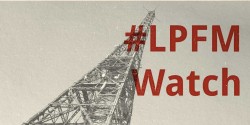It’s been nearly two years since the application window opened for new low power FM (LPFM) licenses and the FCC is still working through a few of the more complicated groups of competing applications. Yesterday, the FCC released a memorandum and order (PDF) in regards to the group of mutually exclusive applications in Baltimore, Maryland.
In September, 2014, the FCC tentatively selected five Baltimore groups as a time-share, based on points awarded by the FCC: Center for Emerging Media, Benedictine Society of Baltimore City, United Workers Association, Johns Hopkins University, and St. Joseph’s Roman Catholic Congregation. A group whose application wasn’t selected, Loyola University (which runs an online student radio station, WLOY, which I visited last year), filed a Petition to Deny, arguing that it should have been awarded an additional point for diversity (because, even though a member of its board of trustees holds interest in two radio stations, she agreed to recuse herself from decisions related to the new LPFM) and also arguing that Johns Hopkins should have received one less point (because the school asked to add the additional point for diversity of ownership after filing its initial application).
According to the FCC order, “Subsequently, BSB, St. Joseph’s, and JHU amended their respective applications to file a time-share agreement in which they aggregated their points awarded them in the September Public Notice for a total of 15 points.”
Yesterday’s order denied Loyola’s Petition to Deny, stating, “We find that the Commission correctly denied Loyola a diversity of ownership point.” However, the order did find that Johns Hopkins should not have been awarded a diversity point. According to the order, “We agree that the September Public Notice erred in awarding JHU a point under the diversity of ownership criterion. As Loyola notes, the Rules and the Instructions clearly state that post-window amendments will not be accepted if they result in additional points being claimed. Accordingly, we deduct this point from the JHU Application’s total, leaving it with four points.”
As a result of yesterday’s decision, there’s a new group of tied tentative selectees in Baltimore: Center for Emerging Media, Benedictine Society of Baltimore City, and United Workers Association. These groups have now been given the opportunity to come up with a time-share agreement. Once they agree to a time-share, it’s likely that both Loyola University and Johns Hopkins University will have their applications dismissed. St. Joseph’s previously filed an amendment to move to a different frequency and its application was accepted.
As a college radio proponent, it saddens me that two college radio stations seem to be on the losing end of this tentative decision. Even though student-run radio stations were allowed to apply for new LPFM licenses, even if their schools held licenses for non-student stations; these groups still lost out on diversity of ownership points and subsequently are losing the chance to have a new LPFM when faced with competitors with no other radio interests.
We will keep on eyes on this in case there are further filings or legal actions.
LPFM Watch is a weekly feature on Radio Survivor appearing every Thursday.



